Jordan urges int’l action to solve Syria crisis, support refugees, hosts
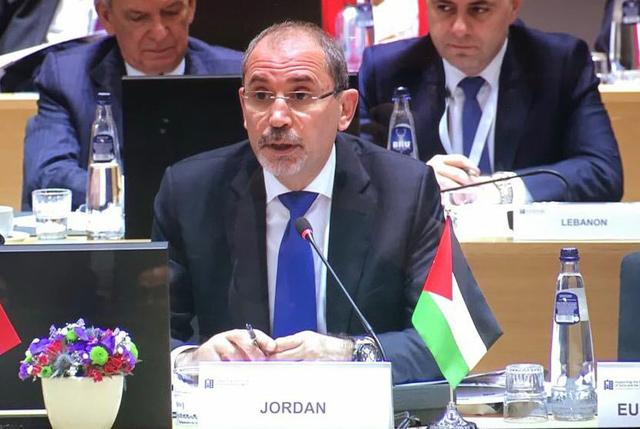
The Jordan Times
AMMAN — Jordan on Wednesday urged the international community to take action to find a political solution to the Syrian crisis and support Syrian refugees and their host communities.
Addressing the Brussels II Conference where dozens of stakeholders gathered to discuss support for Syria, Foreign Minister Ayman Safadi said: “It is important that we are here, but what is more important that we act, adding that action should be on two fronts.
“One, on a political solution to the conflict. Everyone around the table here agrees that there is no military answer to this conflict, that more wars only means there is going to be more killing, more suffering, more destruction and more displacement of people.”
Elaborating, the top diplomat said that the path to this political solution should be based on the ongoing political process in Geneva and Security Council Resolution 2254.
“It should be a solution that first and foremost acceptable to the Syrian people; it should preserve the integrity of Syria, the independence of Syria and the sovereignty of Syria”, he told representatives of 85 states and organisations concerned with the seven-year conflict, where the “situation has never been worse in terms of having very little horizons to move forward for a solution.”
Safadi stressed that the Syrian crisis should not become a refugee issue and the priority should be finding a political solution. Then there is the refugee issue, he said, adding that if the Syrian crisis has shown anything, it has shown that if a problem starts in the Middle East, it will reverberate in Europe and elsewhere.
“But we live as neighbouring countries (Lebanon as Turkey as Jordan) we live with that crisis day-by-day so, we cannot continue to approach it form crisis management perspective. We need to invest in refugees because investing in them is investing in our collective security... we will be building the future army who will hopefully rebuild their country when the crisis stops and when the guns fall silent. If we abandon them to ignorance, to despair, to bitterness then they will be the new army from which what worse than ISIS [Daesh] going to be recruiting 10-15 years from now”.
“We need to destroy Daesh, and to destroy Daesh we need to destroy, to dismantle the environment of despair and anger and chaos on which radicalism thrives.”
Highlighting Jordan’s contribution to the refugee crisis, he said the Kingdom is host to 1.3 million Syrians but the pressure is mounting.
“Our unemployment in Jordan right now is about 18 per cent, and yet we are giving working permits to about 100,000 Syrians over the last year. That is double the number of jobs that our economy is able to create on an annual basis.
Safadi cited more examples of pressures on the country ensuing from the Syrian refugee burden, including the fact that Jordan has admitted 130,000 and more Syrian students in public schools, while it has become increasingly difficult to invest in infrastructure as it should.
He said Jordan is grateful for the support it receives from global donors but it is not enough.
“Our ability, our capacity has been pushed to a limit. We need to have more support to ... to meet our responsibility towards Syrian refugees, and towards this crisis.”
The foreign minister underlined that “donor fatigue” is happening. “The World Food Programme, I think, next month is going to stop providing subsidies to over 500,000 Syrians in Jordan; that means that those people will lose a significant amount of the income that they used to depend on to be able to meet their needs. Other UN agencies are suffering under pressure so what we need to do is to act and act quickly to make sure this gap is bridged.”
Safadi concluded that Jordan has a $2.4 billion response plan and needs support to be able to continue to give schools and to give health services to Syrian people.
“I have to say that, we don’t want to come to a situation in Jordan where we have to make a choice between giving the last available seat in the classroom to a Jordanian child or a Syrian child, because if we get there, that will be the crisis, that will be the ultimate test to our failure, and that’s going to be a failure that will haunt all of us.”
On the sidelines of the gathering, Safadi held separate meetings with an array of top officials and counterparts from countries participating in the meeting. In a tweet, he said that his peers and other officials underlined during the meetings their appreciation of Jordan’s role in the Syrian refugee crisis and stressed the importance of extending sufficient support for the Kingdom to sustain its humanitarian mission.
The minister met with High Representative of the European Union for Foreign Affairs and Security Policy Frederica Mogherini, Norway’s Foreign Minister Ine Marie Eriksen Soreide, Japanese Foreign Minister Kono Taro, and Jean-Baptiste Lemoyne, the French Secretary of State to the Minister for Europe and Foreign Affairs, along with UN Emergency Relief Coordinator Mark Lowcock, Finnish Foreign Minister Timo Soini and Undersecretary of US State Department David Satterfield.
Latest News
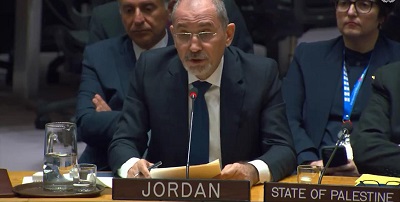 Jordan urges UN to recognise Palestine as state
Jordan urges UN to recognise Palestine as state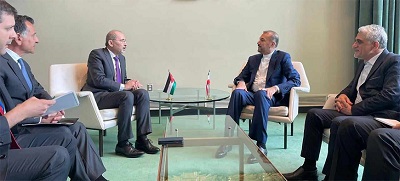 Safadi, Iranian counterpart discuss war on Gaza, regional escalation
Safadi, Iranian counterpart discuss war on Gaza, regional escalation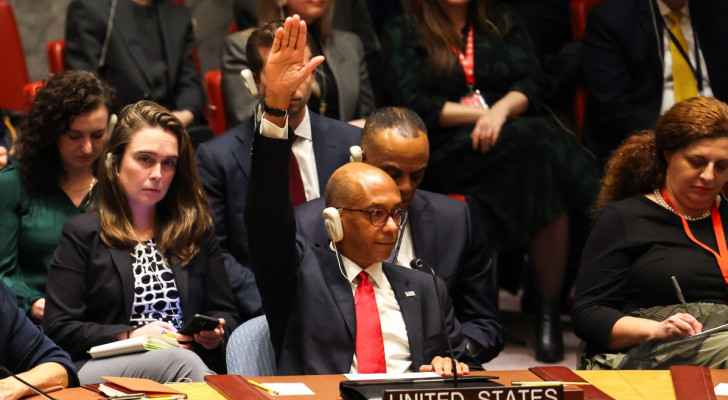 US vetoes Security Council resolution on full Palestinian UN membership
US vetoes Security Council resolution on full Palestinian UN membership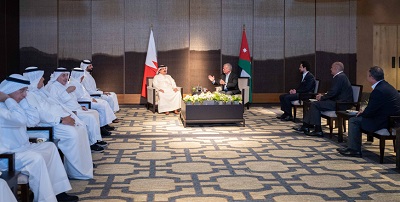 King, Bahrain monarch stress need to maintain Arab coordination
King, Bahrain monarch stress need to maintain Arab coordination Security Council to vote Thursday on Palestinian state UN membership
Security Council to vote Thursday on Palestinian state UN membership
Most Read Articles
- Jordan urges UN to recognise Palestine as state
- Senate president, British ambassador discuss strategic partnership, regional stability
- JAF carries out seven more airdrops of aid into Gaza
- Temperatures to near 40 degree mark next week in Jordan
- Safadi, Iranian counterpart discuss war on Gaza, regional escalation
- US vetoes Security Council resolution on full Palestinian UN membership
- UN chief warns Mideast on brink of ‘full-scale regional conflict’
- Biden urges Congress to pass 'pivotal' Ukraine, Israel war aid
- Google fires 28 employees for protesting $1.2 billion cloud deal with “Israeli” army
- Israeli Occupation strike inside Iran responds to Tehran's provocation, reports say